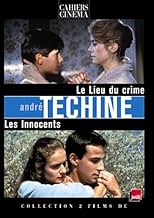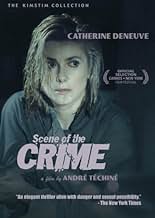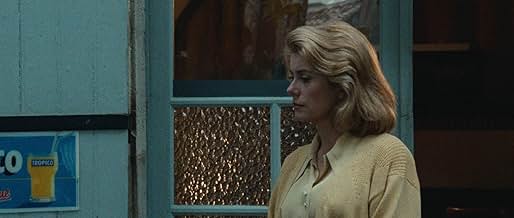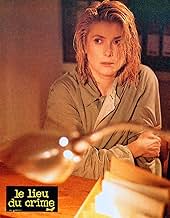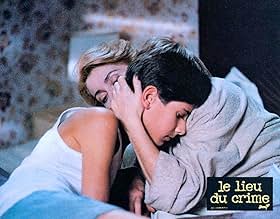Füge eine Handlung in deiner Sprache hinzuIn the woods, a 13-year-old boy is grabbed by an escaped convict and told to bring money later that day. The boy does as he's told, only to be attacked by the convict's partner. A murder ens... Alles lesenIn the woods, a 13-year-old boy is grabbed by an escaped convict and told to bring money later that day. The boy does as he's told, only to be attacked by the convict's partner. A murder ensues, and through happenstance, the murderer and the boy's mother form an alliance. All thi... Alles lesenIn the woods, a 13-year-old boy is grabbed by an escaped convict and told to bring money later that day. The boy does as he's told, only to be attacked by the convict's partner. A murder ensues, and through happenstance, the murderer and the boy's mother form an alliance. All this takes place in four days during which the boy has his first communion, his separated par... Alles lesen
- Regie
- Drehbuch
- Hauptbesetzung
- Auszeichnungen
- 3 Nominierungen insgesamt
- Suzan
- (Nicht genannt)
Empfohlene Bewertungen
Téchiné was renowned for his skill with actors and his style of direction suited her perfectly, so much so that four more collaborations were to come, notably 'Ma Saison Préférée'.
Although very much a vehicle for his leading actress, every character is well drawn in this portrait of fractured relationships and family disintegration. Téchiné excelled in depicting what one critic has termed 'outward conformity and inner confusion' and this film is certainly no exception.
Téchiné has elicited a marvellous performance from Nicolas Giraudi as her troubled teenage son whilst Victor Lanoux is pitch-perfect as her ex-husband. Claire Nebout makes a striking debut whilst the charismatic Wadeck Stanczac appears in his second film for this director. The grandmother who vainly tries to keep up appearances and preserve the family unit is played by Danielle Darrieux, a doyenne of French cinema and one of its true 'greats'.
The somewhat melodramatic material has been tempered by the literate script and by Téchiné's sensitive, elegant direction. The natural setting is beautifully captured by Pascal Marti whilst Philippe Sarde's score is effective but never intrusive.
Mlle Deneuve fondly remembered her participation in this as giving her a pleasure similar to that she had experienced when making 'Le Dernier Métro' and Téchiné freely admitted that their collaboration was the only area where his work showed continuity. Every director needs a Muse and some are lucky enough to find one.
Let me make my bias clear: I am an Alfonso Cuarón fan, and his adaptation of Great Expectations remains my favorite. Still, even the subtle nod to Dickens in Téchiné's work had me wishing, "If only Téchiné would direct a Charles Dickens adaptation!"
With assistance from co-writers Pascal Bonitzer and Olivier Assayas (both of whom have since become directors themselves), Téchiné weaves narrative twists that obscure some of the plot's illogical turns, keeping the audience constantly guessing.
Pascal Marti's signature unsettling camera movements and deceptively simple editing style evoke the tension and immediacy of rapid sketches. From the first frame to the last, nearly every scene is imbued with a sense of anticipation and menace. This is a post-New Wave work where human and psychological motivations take precedence over formal innovation, yet it carries the unmistakable traces of New Wave cinema-elements we sorely miss in contemporary French filmmaking.
The casting is praiseworthy, particularly Catherine Deneuve, who delivers a subtle and commanding performance, and Nicolas Giraudi, whose portrayal of a lost child searching for a father figure is equally compelling.
Thomas's mother Lili (Catherine Deneuve) runs a club on the lake. After a violent altercation between Martin and his accomplice, an injured Martin goes to the club where he meets Lili. She feels attracted to him and decides to help Martin.
The film is full of nuances. The dynamics between Thomas and his parents, and his grandparents and parents is cleverly and in an understated manner brought to our attention. A good example of that is the strained atmosphere and undercurrents at the grand luncheon held to celebrate Thomas's first communion.
The soundtrack is outstanding too. In one of the scenes in the woods where suspense is reaching breaking point, André Téchiné uses the sound of cicadas and crickets building up to a crescendo to accentuate the tension. A very clever technique indeed.
Cinematography is of the highest quality too.
If there is one thing I will remember, it is the quality of the performances; they all are really good. Special mention must be made of the commanding performances by Catherine Deneuve, and by Danielle Darrieux who plays Thomas's grandmother.
I score this film a high 8/10.
Here Catherine Deneuve stars as Lili Ravenel, who has a 13-year-old son, Thomas (Nicolas Giraudi), who is not doing well at school, a father who no longer cares about people at all, including members of his own family, and a mother who is emotionally close and distant by turns. Lili is estranged from her husband, a man she no longer loves, if ever she did. She is a woman of a certain age who finds diversion in managing a night club. Thus we have the familiar psychology of the bored middle class woman who, we know, will be drawn irresistibly to the excitement of an outsider. Directors who find themselves in the enviable position of directing the beautiful, cool and stately Deneuve seem themselves irresistibly drawn to showing her in compromised situations. I'm thinking of Belle de Jour (1967) and Mississippi Mermaid (1969), directed respectively by Luis Buñuel and Francois Truffaut. In the former Deneuve is a day-tripping prostitute and in the latter she is a criminal on the run. For some odd reason there is something deeply moving about seeing Deneuve give into her baser nature. (I think.)
Anyway, here she does indeed give herself to the rough young man who has killed his companion, and she does so without a hint of regret or lingering doubt. Incidentally in Téchiné's Ma Saison Préférée, mentioned above, there is a scene in which a young intern has his way with Deneuve using much the same approach that Wadeck Stanczack, who plays Martin, an escaped con, employs here. That Lili's sexuality is aroused by his crude demand is the psychology that Téchiné wants to concentrate on; but because one of the weaknesses of his movie is a lack of focus, the impact of her desire is not as strongly felt as it might be. For a most striking and stunning exploration of this theme see Vittoria De Sica's unforgettable The Garden of the Finzi-Continis (1971).
Another weakness of this movie is some unconvincing action and dialogue in places. The opening scene in which Thomas is threatened by Martin who demands money to help him escape is a case in point. Martin's threats seem mild and ineffective. One wonders why Thomas is compelled to return. I also wonder about the boy's response to seeing his mother in bed with Martin. His first reaction is to say, "He will kill you!" and then later he asks his father, "Is that love?", which doesn't seem like something a 13-year-old would say. A six-year-old, maybe. Also a puzzle is why Claire Nebout, who is interesting as Alice, the girl involved with the two escapees, stops her car in the rain to pick up Thomas only to throw him out a few minutes later. Why did she stop at all? As the scene was shot he seemed to be in the middle of the road, so she couldn't avoid him, but considering that it was dark and it was raining, I don't think that would happen. At any rate, the purpose of the scene is to show that Thomas, like his mother, is starved for excitement, begging Alice to take him with her.
My favorite Téchiné movie is Rendez-Vous (1985) starring a very young and vital Juilette Binoche, who is clearly adored by the director. It is, like this movie, uneven in places, but Binoche is incredibly sexy and captivating. If you are a Binoche fan, see it. You will experience a side of her not shown in her American movies.
By the way, when this was filmed Deneuve was about 43-years-old and had already appeared in at least 67 films. She is the kind of woman who grows more beautiful as she grows older. I found her much more attractive here than when I first saw her in the celebrated The Umbrellas of Cherbourg (1964), released when she was 21.
(Note: Over 500 of my movie reviews are now available in my book "Cut to the Chaise Lounge or I Can't Believe I Swallowed the Remote!" Get it at Amazon!)
Wusstest du schon
- WissenswertesThe film underwent an HD restoration in 2018 by Eclair, with the support of Arte France's cinema unit and MK2 Films.
- PatzerWhen Thomas first tries on his suit that "itches", his top shirt button is undone. But when he undresses in his room shortly after that, he undoes that button too.
- Alternative VersionenVideo version runs 74 minutes.
- VerbindungenFeatured in Danielle Darrieux: Filmstar mit dem frechen Etwas (2019)
Top-Auswahl
- How long is Scene of the Crime?Powered by Alexa
Details
- Erscheinungsdatum
- Herkunftsland
- Sprache
- Auch bekannt als
- Scene of the Crime
- Drehorte
- Auvillar, Tarn-et-Garonne, Frankreich(street scenes, hotel, bridge over river)
- Produktionsfirmen
- Weitere beteiligte Unternehmen bei IMDbPro anzeigen
Box Office
- Bruttoertrag in den USA und Kanada
- 164.187 $
- Laufzeit1 Stunde 30 Minuten
- Sound-Mix
- Seitenverhältnis
- 2.35 : 1

![Bande-annonce [OV] ansehen](https://m.media-amazon.com/images/M/MV5BMGZlMGQ4MjQtNTJkNC00MmMzLWFhYzgtMjZlNWFmY2NhMGY0XkEyXkFqcGdeQXRyYW5zY29kZS13b3JrZmxvdw@@._V1_QL75_UX500_CR0)
